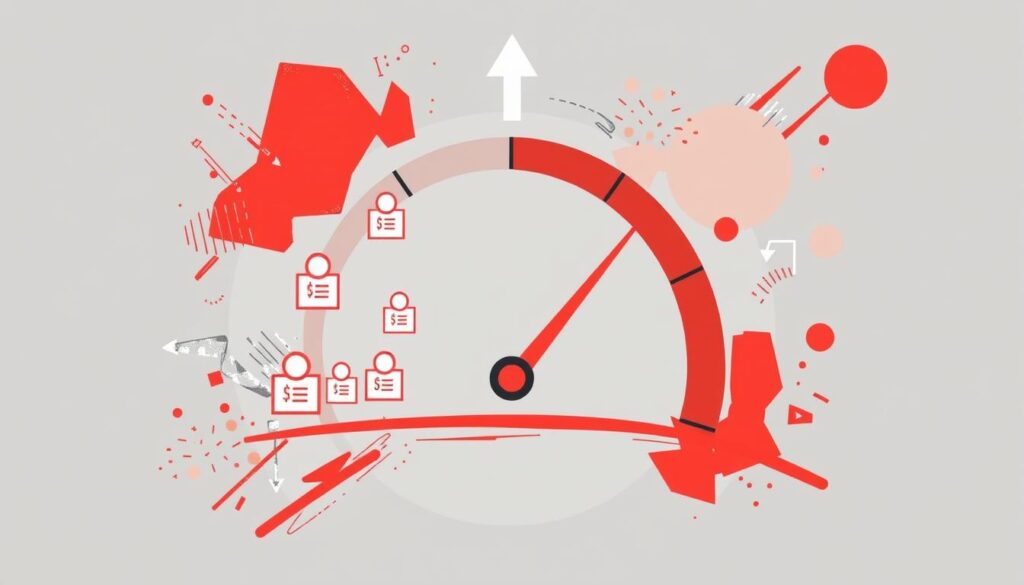Your credit score is key to your financial health. Yet, many people don’t get how important it is. This guide will show you how to boost your score and get better financial deals.
We’ll cover everything from paying on time to mixing up your credit types. Whether you want an “exceptional” score or just a better one, we’ve got you covered. You’ll learn the steps to improve your credit and move forward financially.
Make On-Time Payments
Your payment history is key to your credit score, making up 35% of your FICO® Score. It tracks your payments on credit cards, loans, and more. Making payments on time is crucial for a good credit score.
Tips for Making Timely Payments
- Set up automatic payments for at least the minimum due amount to ensure you never miss a due date.
- Create calendar reminders and alerts for your payment due dates to stay on top of your financial obligations.
- Enroll in Experian Boost to get credit for timely payments of eligible bills like utilities, cell phone, and streaming services that may not be traditionally reported to credit bureaus.
- If you’re struggling to make payments on time, reach out to your creditors to discuss options like payment plans or temporary hardship accommodations.
- Consistently making on-time payments is crucial – even one or two late payments can significantly impact your credit score.
Remember, payment history is the most important factor in your credit score calculation. By making all of your payments on time, you can steadily improve your credit and open up more favorable financing opportunities in the future.
| Credit Score Impact | Payment Behavior |
|---|---|
| Positive Impact | On-time payments |
| Negative Impact | Late or missed payments |
“The longer you pay bills on time, the more potential for FICO Scores to increase.”
Pay Down Revolving Account Balances
Your credit utilization rate is key to your credit score. It shows how much of your available credit you’re using. Experts say to keep it under 30%, but the lower, the better. To boost your score, focus on reducing the balances on your revolving credit accounts.
Strategies to Reduce Credit Card Debt
Here are ways to tackle high credit card balances:
- Debt consolidation loan: Get a personal loan with a lower interest rate to pay off your high-interest cards.
- Balance transfer card: Open a new card with a 0% intro APR and move your balances there.
- Debt management plan: Work with a credit counselor to get lower rates and a repayment plan.
- Debt snowball method: Pay off the smallest balance first, then use that money for the next smallest.
- Debt avalanche method: Start with the card with the highest interest rate, then move to the next highest.
Choose any method, but make paying down your credit card debt a top priority. Lowering your credit utilization can greatly improve your credit score.

Don’t Close Your Oldest Account
Your credit history is key to your credit score, making up 15-20% of it. The age of your oldest account and the average age of all your accounts matter a lot. Closing your oldest credit card can hurt your score, so think twice before doing it.
Even if you don’t use a credit card anymore, keeping it open is good for your credit history. The longer your credit history, the better. Closing an account, especially your oldest one, can shorten your history and lower your score.
If a credit card has an annual fee or doesn’t fit your needs anymore, think before you close it. You might negotiate with the issuer to waive or reduce the annual fee. Or, you could request a product change to a different card within the same issuer’s portfolio. These steps can help you keep the account and keep your credit history strong.
Deciding to close a credit card should be a careful choice. It affects your credit history and score. By keeping your oldest account open and managing your credit well, you can keep your credit history strong and support your financial goals.
“The average age of credit accounts may decrease if the oldest credit card is closed, but the impact can be mitigated by the information remaining on the credit report for up to 10 years.”
Diversify the Types of Credit You Have
Building a strong credit profile is more than just managing your credit card balances. Your credit mix, which makes up 10% of your FICO® Score, includes different credit types like credit cards, loans, and mortgages. Having a diverse credit mix can help boost your credit score over time.
If you’re new to building credit, think about getting a starter credit card or a credit-builder loan. These can help you start a credit history and show you can handle different credit types well.
- Revolving credit, like credit cards, lets you borrow and repay as needed.
- Installment credit, such as auto loans, personal loans, and mortgages, involves borrowing a set amount and repaying it in regular payments.
As your credit needs change, aim for a mix of revolving and installment credit accounts. Don’t take on too much debt to improve your credit mix. Instead, focus on managing what you have well, making payments on time, and keeping balances low.
Remember, building a diverse credit profile is a long-term goal. It takes time, but it can lead to a better credit history and higher credit score.
Credit Score Tracking
It’s crucial to watch your credit score and report closely. By checking your credit info from Experian, Equifax, and TransUnion often, you can spot ways to improve your score. This helps you take steps to increase it.
Many banks and credit card companies offer free credit monitoring services. These services give you updates on your credit score changes. They also alert you to any odd activity on your credit report.
| Service | Monthly Cost | Key Features |
|---|---|---|
| Equifax Complete™ Premier | $19.95 |
|
| Equifax Complete™ Family Plan | $29.95 |
|
There are also free ways to monitor your credit, like Credit Karma. It offers credit score monitoring and credit report review from Equifax and TransUnion.
Keeping an eye on your credit and tracking credit score changes is key. It helps you manage your finances better and keeps your credit in good shape.
Limit New Credit Applications
Keeping an eye on new credit applications is key to your credit score. Each time you apply for a credit card or loan, a hard inquiry is made. This can slightly lower your credit score, possibly by a few points.
Tips for Managing Hard Inquiries
To protect your credit score, follow these tips:
- Apply for credit only when you really need it. Don’t apply for many credit applications just to see what you qualify for.
- Use prequalification or preapproval offers. These soft inquiries won’t hurt your credit score.
- If you need to apply for several loans, do it in a short time. This way, the inquiries are counted as one, reducing the credit score impact.
While hard inquiries can slightly lower your credit score at first, the effect fades over time. Being smart with your credit applications helps keep your credit score healthy. This way, you can still get the financing you need.

Dispute Inaccurate Information on Your Credit Report
Keeping your credit report accurate is key to your financial health. Mistakes like late payments or high balances can hurt your score. This makes it harder to get credit, insurance, or even a job. If you find errors, you can dispute them with the credit bureaus.
You can start a dispute online, by mail, or by phone with Experian, Equifax, and TransUnion. It usually takes 30 to 45 days to fix, depending on the needed documents.
Disputes can lead to changes in your report. This might include adding, updating, deleting, or keeping the info the same. While disputing doesn’t directly change your score, fixing errors can help. Removing negative marks can boost your score, but removing good info might lower it.
If you’re not happy with the outcome, you can appeal. You can contact the data furnisher, add a statement, and resubmit with more info. It’s important to check your reports often and fix errors quickly. This helps keep your credit healthy and protects you from credit report errors and identity theft.
| Dispute Method | Credit Bureau Contact Information |
|---|---|
| Online |
|
| By Mail |
|
| By Phone |
|
Checking your credit reports often and fixing errors quickly is vital. It keeps your credit healthy and protects you from credit report errors and identity theft.
Become an Authorized User
If you’re new to credit or rebuilding your credit score, getting added as an authorized user can help a lot. This is especially useful for those with little credit history or can’t get a card on their own.
The effect of being an authorized user depends on the credit card management and your credit profile. If the main cardholder pays on time and keeps a low credit utilization rate, it can really help your credit score. A study showed that people’s credit score went up by almost 11% in just three months after becoming an authorized user.
To use this strategy, ask a parent or someone you trust to add you to their card. But first, check if the account has good payment history and a low credit utilization rate. Remember, the main cardholder is responsible for the credit card balance. So, it’s important to watch how they manage their card.

Being an authorized user is a great way to build or improve your credit history and credit score. By using someone else’s good credit history, you can quickly improve your credit profile. This can help you achieve long-term credit success.
Credit Monitoring Services
Keeping an eye on your credit score and credit report is key to better financial health. Reviewing your reports from Experian, Equifax, and TransUnion helps spot areas for improvement. Many places offer free credit monitoring to help you track your credit.
Free services like SoFi give weekly updates on your credit score. They use the TransUnion VantageScore 3.0 model. This shows how different factors like payment history and credit utilization affect your score.
Checking your own credit report is safe and doesn’t hurt your score. Services also offer advice from financial planners. They let you see how different choices might affect your score.
Experian’s free service alerts you to new inquiries and account changes. Other companies like Aura and IdentityForce® offer more features. These include identity theft protection and dark web scanning, for a fee.
| Service | Plan Cost | Features |
|---|---|---|
| Aura | $10/month to $39/month | Protection against financial fraud, identity theft, spam calls, online theft, phishing, scam websites, viruses, malware, and tailored security features for families and kids |
| IdentityForce® | $19.90 to $39.90 per month or $199.90 to $399.90 per year | 3-bureau credit monitoring, alerts, and reports with options for family plans and dark web scanning |
| PrivacyGuard | $9.99 to $24.99 per month | Daily triple-bureau credit monitoring, financial calculator suite, and neighborhood reports |
| Experian IdentityWorks | Free to $34.99 per month | 1-bureau or 3-bureau credit monitoring, FICO® Score 8, dark web scanning, and identity theft insurance coverage up to $1 million |
Using these credit monitoring services helps you stay on top of your credit score. It lets you catch issues early and protect your finances.
Conclusion
Improving your credit score is a long-term effort but very important. By making timely payments, reducing debt, and checking your credit report, you can improve your score. Remember, fixing your credit takes time and effort, but it’s worth it.
A good credit score helps you get better deals on loans and credit cards. It can also lead to lower insurance costs and better job opportunities. So, working on your credit score is a smart move for your financial future.
The path to a better credit score has its challenges, but with determination, you can succeed. Use the tips from this article to manage your credit well. This will help you achieve financial stability and a secure future.






